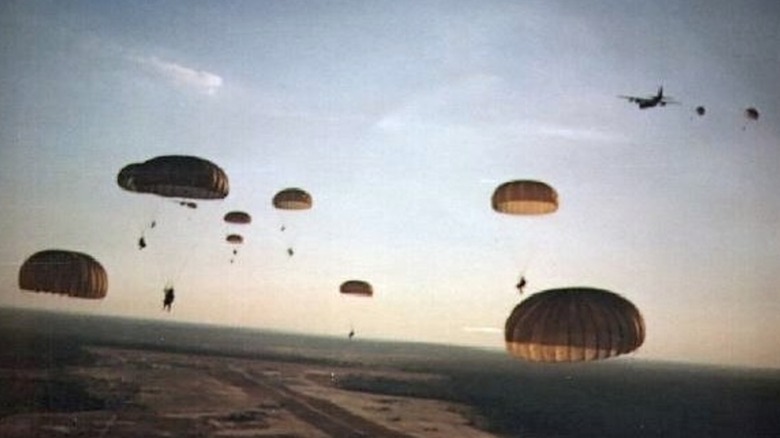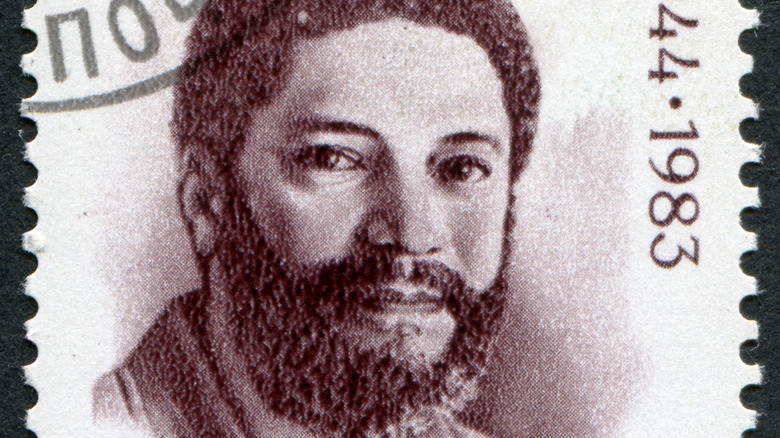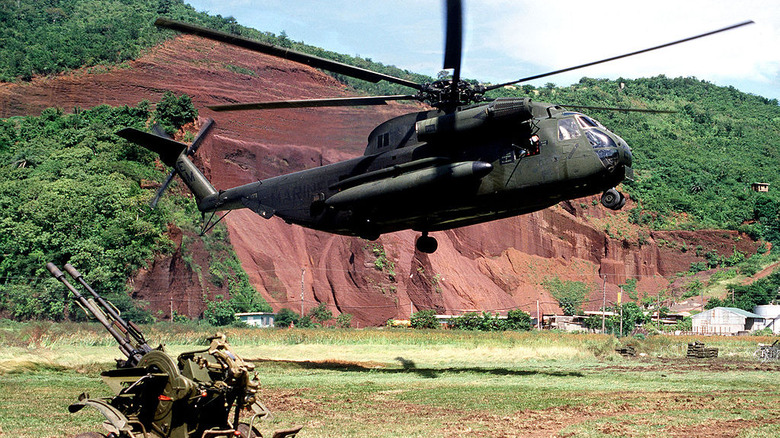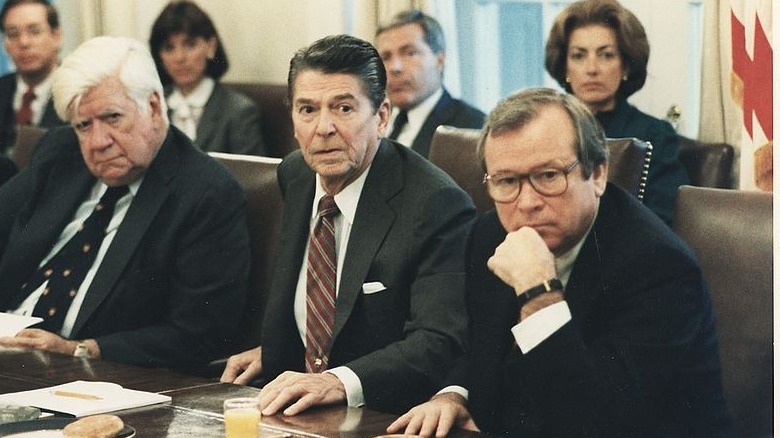Inside America's Often Forgotten 3-Day 'War' With Grenada
You can do a lot in three days — go on a road trip, reminisce with old pals, or, as it turns out, invade Grenada. Not only is this skirmish often overlooked in the annals of American history, but the "war" itself is a strong contender for one of the shortest wars ever. It generated a lot of criticism for the United States, as well as the ire of the international community at the time. But what was the point?
Grenada, lovingly known as "The Land of Spices," has a lengthy history of colonization by imperialist powers. The country gained independence from the dominion of the United Kingdom in 1974 but remained a Commonwealth member (via Britannica). Grenada struggled to find its political footing in the aftermath of independence. Initially, two parties dominated the political sphere: the conservative National Party and the Labor Party.
Eric Gairy, Grenada's first prime minister, tried to disrupt this equilibrium by establishing the Mongoose Gang, a militia that ruthlessly suppressed protests and received backing from Chile's monstrous dictator, Augusto Pinochet (per People's World). To counteract the growing influence of the status quo, a group with a different vision for Granada began fighting back against Gairy and the Mongoose Gang. Eventually, the violence reached a boiling point, and for several years, demonstrations and infighting raged against the nation.
Maurice Bishop eventually toppled Gairy in a coup in 1979 (per The New York Times). However, during the following few years, Bishop suppressed opposition and established a one-party Marxist-Leninist government that, curiously, continued to utilize currency depicting Queen Elizabeth II (per Global Exchange).
The Bishop's Fall and a Call to Arms
Regardless, Maurice Bishop retained proletariat support by instituting universal healthcare, equal pay, and bolstering the country's literacy rate, even though many loathed him (via History in Politics). His worst blunder, however, was aligning Grenada with some of America's most vexing rivals: the Soviet Union and the pariah state of Cuba. Bishop went so far as to allow Cuba to build an airport on Grenada, which set off alarm bells for U.S. President Ronald Reagan. Reagan was worried this alignment would echo the Cuban Missile Crisis and Grenada would allow Soviet fighter jets to use Grenada as a base.
Concurrently, dissent and calls for Bishop to step aside were sweeping across the island of Grenada. Eventually, Bishop was placed under house arrest by political rivals vying for power in another attempted coup. Bishop did, however, hold some backing among the working classes, who swarmed his home in October 1983 and demanded his release (via History in Politics). Bishop eventually escaped but was slain in a firefight shortly afterward (per BBC News). Many of Bishop's compatriots were also executed, creating a political vacuum that the military was glad to fill. The Grenadian army was helmed by General Hudson Austin, who spared no time in imposing a national curfew to quell unrest. Anyone who was caught outside would be shot on sight (via The Washington Post).
However, there lay a thorn in the General's plan. Before being apprehended by the army, the governor-general, Paul Scoon, had already requested foreign aid. In response, Uncle Sam and a coalition of Caribbean nations soon entered the fray to "liberate” the Grenadian people (per The New York Times).
Operation Urgent Fury
Before the U.S.-led forces launched their offensive, they likely had no idea how soon Grenada would fall. On October 25, 1983, approximately 8,000 American soldiers — including marines, paratroopers, and Navy SEALS, alongside 350 Caribbean troops — launched an amphibious assault on the island supported by persistent airstrikes (per Air & Space Forces Magazine). On the flip side, Grenada's resistance forces were completely outgunned and numbered just 1,500 men, aided by 700 Cuban troops and military professionals from other communist regimes like East Germany, the Soviet Union, and North Korea (per The New York Times).
Despite having one of the world's best-equipped militaries, the Americans encountered several logistical issues from the outset. The U.S. was first taken aback by how defiantly and fiercely the opposing forces battled. They even had to rely on tourist maps to travel around the island, according to Politico. Although brief, the conflict was action-packed and relentless. The Cubans vigorously defended the airport, which eventually fell on the second day. However, the tide inevitably turned, and the appetite for resistance had mostly faded by the third day, as the island's capital, St. George's, had fallen. Unfortunately, due to inadequate intelligence and communication, 24 innocent bystanders were killed during the fight (via ThoughtCo).
After the smoke had cleared, the Americans tallied 19 dead and 150 wounded. For the Cuban army, 25 people were killed, and 59 were injured. For the Grenadians, 45 soldiers had been lost, with 337 fatalities (per Britannica). After the invasion, General Hudson Austin was imprisoned for life, and the Americans stayed on the island for several months to keep a watchful eye on the new government.
International Backlash
After the war, the Ronald Reagan administration was ready to laud the invasion as an efficient American victory. Surprisingly, despite the atrocities of the previous decade's Vietnam War still vivid in the minds of many Americans, there was strong domestic support for the Grenada intervention (via TIME). Reagan himself alluded to the fact that almost 1,000 American nationals, including students studying medicine on the island, were potentially in danger during the coups, which provided him with the perfect excuse (via ThoughtCo).
So, how was this three-day "war" received on the international stage? At the time, the conflict was met with skepticism, controversy, and condemnation. Britain was outraged that a Commonwealth nation had been invaded without so much as a head's up, per The Guardian. By all accounts, both Margaret Thatcher and the famously apolitical Queen Elizabeth were not happy campers (via United Press International). Globally, the United Nations condemned the "war" and accused the U.S. of acting unlawfully. The United Nations overwhelmingly denounced the invasion, voting 108 to 9 (via The Washington Post).
Still, the international repercussions of this were virtually toothless. But how did the Grenada people react to the incident? While some Grenadians were doubtless glad to be "rescued," this narrative is overly simplistic, and the conflict's legacy remains complicated. While October 25 is a public Thanksgiving Day in Grenada, many Grenadians were likely dissatisfied with being treated as pawns between two regimes (via the Los Angeles Times). Even today, it's debatable how much of America's response to the call for aid was genuine and just how much was merely a pre-planned chess move to undermine the Communist influence in the Caribbean.



